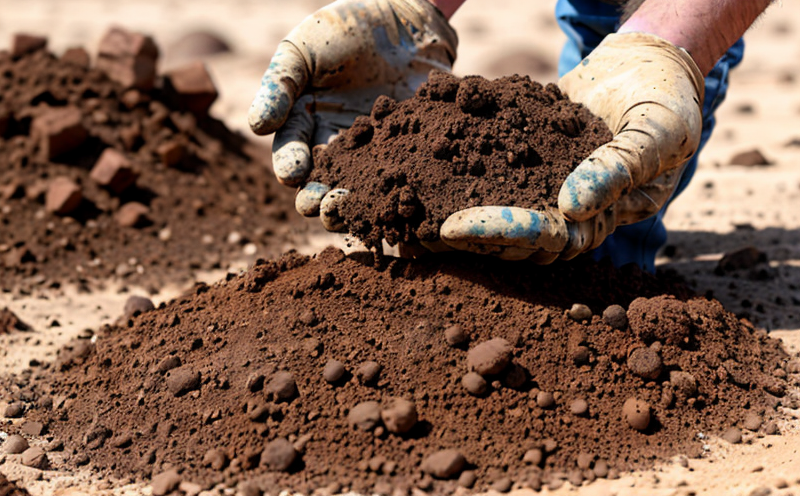ASTM D698 Standard Proctor Compaction Testing
The ASTM D698 standard proctor compaction test is a fundamental procedure used in soil and overburden characterization, particularly for the construction of embankments, roadways, and other structures. This testing method evaluates the relationship between moisture content and the maximum dry density achievable when compacting materials under controlled conditions.
This procedure is widely recognized as an industry standard due to its ability to provide consistent results across various laboratories. The test involves determining the optimal combination of water content and compaction effort that yields the highest possible density for a given soil type. This information is crucial for ensuring structural integrity, minimizing settlement risks, and optimizing material use.
The ASTM D698 test is particularly relevant in mining operations where understanding the physical properties of overburden materials can significantly impact excavation efficiency, waste management, and final product quality. The test helps to predict how different moisture levels will affect compaction, which is essential for effective waste disposal and tailings management.
The testing process involves several steps: initially, soil samples are prepared by sieving the material to a specific size range. Then, water is added to achieve various moisture contents. These mixtures are then placed into cylindrical molds and compacted using a standard hammer. The test measures the dry density of the specimen after reaching its maximum.
The results of this testing provide critical data for engineers designing structures or embankments in mining operations. For instance, it can help determine the appropriate moisture content to achieve the desired compaction level, ensuring that materials are neither too loose nor too dense. This balance is essential for achieving optimal performance and longevity of the structure.
The test also plays a vital role in compliance with international standards such as ASTM D698 and EN 12683-5. Compliance with these standards ensures that testing procedures are consistent across different laboratories, providing confidence in the accuracy and reliability of results. This consistency is particularly important in global mining operations where data sharing between different sites is common.
Understanding the practical implications of ASTM D698 compaction testing can significantly impact a project's success. For example, it can help minimize construction delays by ensuring that materials are compacted to the correct density before they are used on-site. Additionally, this test helps reduce material waste and optimizes resource use, which is crucial in cost-effective mining operations.
In conclusion, ASTM D698 compaction testing is a critical tool for understanding soil and overburden properties in mining environments. By providing precise data on moisture content and optimal compaction levels, it ensures that structures are built to the highest standards of integrity and durability. This test contributes significantly to the overall quality assurance process in mining operations.
Applied Standards
The ASTM D698 standard proctor compaction test is widely recognized and applied across various sectors, including geotechnical engineering, environmental science, and civil construction. This procedure is particularly relevant for projects involving large-scale earthworks such as roadways, embankments, and landfills.
- ASTM D698: Standard Test Method for Compaction of Soil in the Field or in the Laboratory.
- EN 12683-5: Specification for Soil and Rock - Part 5: Determination of Compaction Characteristics by Proctor’s Method.
- ISO 17490: Geotechnical Engineering — Methods for Determining the Physical Properties of Soils in the Field or Laboratory.
The application of these standards ensures that testing procedures are consistent and reliable, providing accurate data across different laboratories. This consistency is crucial for ensuring compliance with international regulations and for facilitating effective communication between various stakeholders involved in mining operations.
Eurolab Advantages
At Eurolab, we offer a comprehensive range of services to support your mining testing needs, including ASTM D698 standard proctor compaction testing. Our team of experienced professionals ensures that every test is conducted with precision and accuracy, adhering strictly to international standards.
- Expertise: Our laboratory boasts a team of highly skilled geotechnical engineers and quality assurance experts who are well-versed in ASTM D698 compaction testing procedures.
- Equipment: We utilize state-of-the-art equipment to ensure accurate and repeatable results. This includes high-quality hammers, precision scales, and other essential instruments required for the test.
- Consistency: Our adherence to international standards ensures that our results are consistent and reliable across different testing sessions and laboratories.
- Compliance: We ensure full compliance with all relevant standards, including ASTM D698, EN 12683-5, and ISO 17490. This guarantees accuracy in your test data and enhances the credibility of your project.
- Quality Assurance: Our rigorous quality assurance protocols ensure that every test is conducted under controlled conditions, minimizing variability in results.
- Support Services: In addition to testing services, we offer expert consultation on soil and overburden characterization, helping you make informed decisions based on our comprehensive data reports.
We pride ourselves on delivering high-quality, reliable test results that contribute significantly to the success of your mining operations. With Eurolab, you can trust in accurate and consistent testing that meets the highest industry standards.





